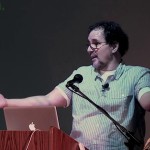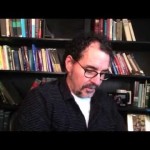We run our website the way we wished the whole internet worked: we provide high quality original content with no ads. We are funded solely by your direct support. Please consider supporting this project.

The One True Source
In the weeks to come, I’d like to share some thoughts on each of the nine convictions (expressed in A ReKnew Manifesto) that ReKnew seeks to promote. The ReKnew team is convinced that this “Manifesto” articulates aspects of the Kingdom that were largely neglected or misconstrued in traditional Christianity, but that will characterize the new Kingdom movement that God is now raising up around the globe. Along with our other posts, our plan is to discuss one of these core convictions each week for the next several weeks.
For reasons that will become clear below, the first core conviction expressed in the “Manifesto” is by far and away the most important. It concerns our source of LIFE – meaning our core sense of identity, worth, significance, and security. (To distinguish this LIFE from mere biological “life,” I’ll capitalize it.) All these aspects of our sense of self factor into our feeling “fully alive.” Our conviction is that, in contrast to all other animals that are for the most part satisfied with biological life, humans have an inbuilt desperate hunger to experience this deeper kind of LIFE.
People experience the absence of LIFE in a variety of ways. Some experience it as a gnawing sense of alienation, futility, fatigue, boredom, or depression. Others experience it as a sort of pervasive anxiety or even terror residing just beneath the surface of their consciousness. People typically associate this existential pain with something in their environment or in some aspect of their circumstances. They sincerely believe that the reason they are depressed or anxious, for example, is because of things such as their precarious job, their difficult marriage, their inconsiderate friends, or their poor health. Or they may blame their inner pervasive pain on the fact that no one appreciates them, on the tragedy that happened to them, on a loved one, or on the fact that they were raised by emotionally detached parents. “If only my circumstances were different,” they tell themselves, “then I’d be happy and full of life.”
It’s an illusion. While unfortunate circumstances can certainly bring about pain, they are not the cause of this pain. As Kierkegaard so profoundly observed (especially in Sickness Unto Death), the existential angst that permeates our inner being is rather due to our estrangement from our ultimate ground of being. We sense that we are alienated from the One who created us and who sustains us moment-by-moment. We are misaligned with the One who alone can fill us with the fullness of life he created us to enjoy. All sin in our life and all evil that humans afflict on one another is ultimately the result of humans acting out of this relentless pain in the core of our being.
Jesus came into the world to free us from the sin and the oppressive power that barricades us from our source of LIFE. This is captured most simply and profoundly in John’s Gospel. While Satan is a “thief” who comes “only to kill, steal and destroy” the LIFE that God wants us to enjoy, Jesus came so that we might have “life to the full” (John 10:10). This is the “eternal life” everyone receives when they genuinely surrender their lives to Jesus (e.g. John 3:15; 5:24). This is the bottomless, ever-refreshing reservoir that gushes forth from our innermost being as we abide in Christ (John 7:38; cf. 4:14; 15:1-5). In fact, this is nothing less than the eternal LIFE of the triune God that was perfectly manifested in the Son, and that God wants to share with his children by incorporating them into the Son. As Peter states it, we are by faith made “participants of the divine nature” (2 Peter 1:4).
It’s our conviction that participating in this LIFE is the point of everything. So far as we are told, the Father, Son, and Holy Spirit created the cosmos for the purpose of sharing their fullness of LIFE with others. And this, we believe, is what the Kingdom of God is all about. The Kingdom is not first and foremost a movement of people who believe certain truths, who conform to a certain ethic, or who are commissioned to change the world in certain ways. At its core, the Kingdom is a movement of people who are experiencing and being transformed by the LIFE that Jesus brought into this oppressed world. To the extent that God reigns over an individual’s or a group’s life, they share in and manifest this LIFE. And the tell-tale sign that this LIFE is present is that the individual and group looks like Jesus, dying on the cross for his enemies.
The first conviction of the “ReKnew Manifesto” is about our source of LIFE because everything about the Kingdom is predicated on this. To the extent that we lack this LIFE, we will be hungry and so will invariably be trying to derive LIFE from other sources. This is what the Bible calls “idolatry”—treating other things as God by trying to wring out of them the LIFE that only God can give. Secular people tend to make idols of things like achievements, beauty, intelligence, fame, nationality, or sexual pleasure. But people who are more spiritually inclined – including followers of Jesus – are typically inclined to try to get LIFE from RELIGION. We feel most fully alive when we are convinced God or the gods approve of us, or are at least appeased, because we are the unique tribe that believes all the right things and engages in all the right behaviors—in contrast to others who believe wrong things and engage in wrong behaviors. This is the religious idolatry of the Pharisees, and as Jesus’ harsh response to them indicates, this idolatry is a far darker form of bondage than the bondage of secular idolatry.
ReKnew is passionate about defending a correct understanding of God, his Word, and his Kingdom. And we are passionate about confronting views of God, his Word, and his Kingdom that we believe are erroneous, harmful to those who embrace them, and harmful to the cause of the Kingdom inasmuch as they give unbelievers justified grounds for rejecting them. But we are also keenly aware of the ever-present temptation to get sucked into religious idolatry. We are aware of how easy it is to unconsciously degenerate to the point that we are feeling good about ourselves because we are right and oppose those who are wrong, rather than feeling good only because we know how much we mean to God on the basis of the love he expressed on the cross.
For this reason, the first thing we want to say is that our highest priority—above all the particular views we may express—is to always get our LIFE from Christ alone and to encourage others to do the same. For if one gets their LIFE from their beliefs, it matters nothing how correct their beliefs are. Their beliefs are a diabolic idol that is competing with, rather than serving, Jesus.
I close with this challenge and exercise – a challenge and exercise I personally pose to myself at the start of almost every day. First, ask God to help you be ruthlessly honest with yourself. This is always the first and most difficult challenge. Our hearts are “desperately wicked” (Jeremiah 17:9) and we are instinctive experts at deceiving ourselves!
Then, when you feel you’ve arrived at a place of total honesty, ask yourself: What really is your source of LIFE? What is it really that makes you feel “fully alive”? What really makes you feel good about who you are and about what your life amounts to? What really makes you feel security in life? When you’re honest with yourself before God, are you hungry for the applause of the crowd or perhaps a special person? Are you hungry for that feeling that others look up to you, or find you sexy, or think you’re smart, or admire your achievements? And when your religious or political beliefs get challenged, do you find yourself getting angry or feeling intimidated?
The truth is we are participants in the Kingdom to the extent – and only to the extent – that we can honestly answer the above question by saying that we drink from the bottomless well of God’s love for us expressed when Jesus died on the cross. To the extent that our honest answer to the above question is rooted in anything else—including our alleged superior beliefs and behaviors—we are involved in idolatry. And when you discern that your LIFE is derived from some other god, whether secular or religious, I encourage you to ask God to help you to simply return to Christ as your all-sufficient source of life and to let the false god go. This is what it means to “die to yourself.” And this is what Jesus means when he promises us that if we will lose our life, we will find it (Luke 17:33).
Today and every day from now on, lay down your idolatrous life and cling to Christ so that you “may have life, and have it more abundantly” (John 10:10).
Related Posts:
Image by Stuart Caie. Used in accordance with Creative Commons. Sourced via Flickr.
Category: General
Tags: Kingdom Living, ReKnew
Related Reading

Friday Lights: Living the Best Day Ever
Each Friday we post content sent to us by our readers that is inspiring, funny, lighthearted or just generally fun. If you’d like more information on submitting content for this feature you can get more information here. Today’s post comes to us from Brandon Andress. This is a post from last December from his website. Very inspiring.…

Join the Revolution!
We are living at a very important, and very exciting, juncture of history. The old religion of Christendom that has been identified with “Christianity” the last 1600 years is dying, and out of its ruins is arising a new tribe of kingdom revolutionaries. All around the globe people are getting the revelation that the kingdom…

The Warfare Worldview
The Warfare Worldview from Roberta Winter Institute on Vimeo. Here’s a video presentation that Greg did at the Roberta Winter Institute regarding the Warfare Worldview. Enjoy!

The “Kingdom Now”: Reflections on Magical American Christianity
One major problem American Christians face is that we tend to embrace a magical view of the Christian faith. We assume that if a person “prays the sinners prayer,” “surrenders their life to Christ,” and “accepts Jesus as Lord of their life,” this somehow magically “saves” them and will sooner or later magically transform them…

Drum Roll Please: Greg’s Final Critique of Bart Ehrman’s Article
This is the ninth and final of several videos Greg put together to refute Bart Ehrman’s claims published in the article What Do We Really Know About Jesus? Thanks for hanging in there for this last one. I know it was a long wait, but the holidays got inordinately busy for Greg. In this segment, Greg talks…

End of Year Reflection
As we approach the end of this year, I’d like to take a moment to personally thank all of you who are invested in ReKnew. Honestly, your prayers, your words of encouragement, and your financial support mean the world to me and to the entire ReKnew team. It has been a truly exciting year. I…
